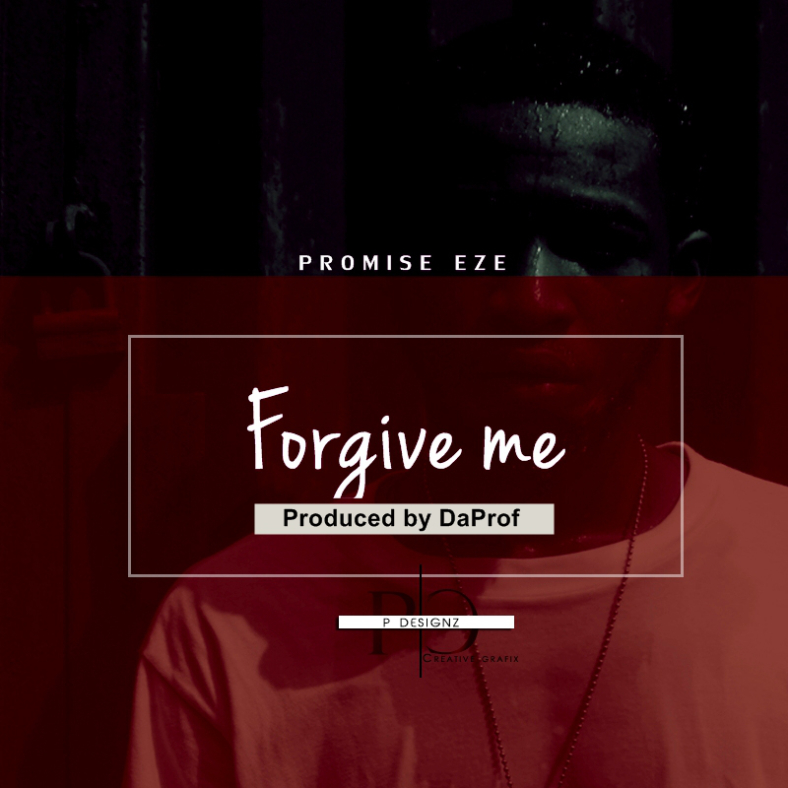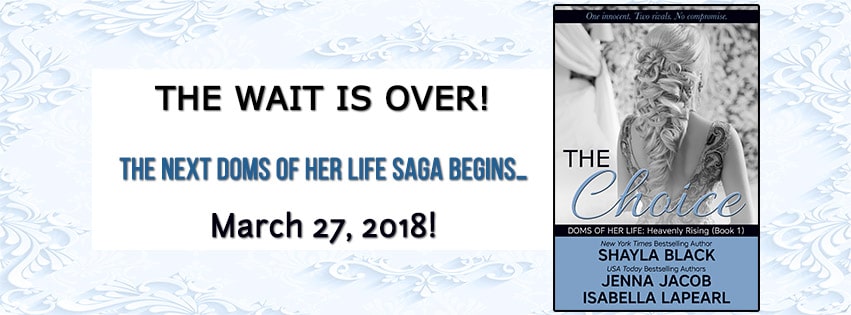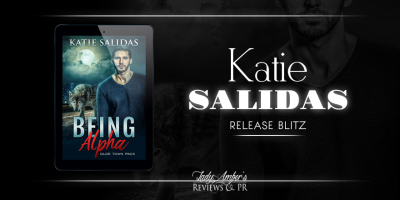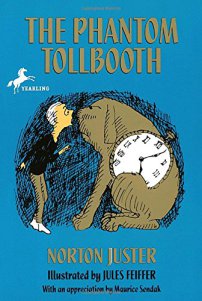
See bottom for links to further entries in the “Reading 2017” series.
Well, 2017 has been an absurd year in too many ways, so it was nice to end it with the feeling that at least my reading wasn’t doing too badly. As I’ve mentioned earlier in the series, I wanted to focus more on content and not just books in terms of numbers. After my first year reading challenge (2016), in which I aimed for a certain amount of books to read, I found a way this time to shift away from that numeric goal with some fun and variety. The dirty details:
Three books from each of three new or newish genres:
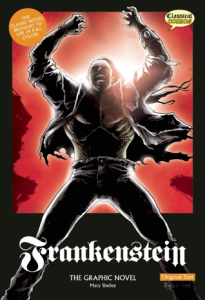 Graphic novel: These turned out to be The Metamorphosis; The Iliad and the Odyssey and Frankenstein. In passing I also read a couple of Raina Telgemeier’s, who I knew from my son having read her in the lower grades. Two, Smile and Claudia and Mean Janine, I quite liked, though a third not so much as the whole story generally felt unfinished. All three of my central choices I’d read before (in “regular” form) and loved—save The Iliad, which I mildly enjoyed. (Perhaps I ought to give that another shot in ’18.)
Graphic novel: These turned out to be The Metamorphosis; The Iliad and the Odyssey and Frankenstein. In passing I also read a couple of Raina Telgemeier’s, who I knew from my son having read her in the lower grades. Two, Smile and Claudia and Mean Janine, I quite liked, though a third not so much as the whole story generally felt unfinished. All three of my central choices I’d read before (in “regular” form) and loved—save The Iliad, which I mildly enjoyed. (Perhaps I ought to give that another shot in ’18.)
Until reading Mary Shelley’s entry in a sort of nineteenth-century Fright Night writing contest, the only thing I really knew about Frankenstein was that everybody mistakenly referred to the monster by the title name. I was surprised at how much I liked the plot way back, though I admit Shelley’s style of writing more than likely had something to do with it. Nevertheless, the graphic novel version held up as well, even though it lost a bit from me knowing how it would end. Still, the tension was apparent and you felt for all parties involved; there just was no winning corner.
In contrast is The Odyssey, which in previous poetic reading I loved on a level so much higher than Frankenstein that I even told stories from it to my boy when he was littler (the island of the cyclops being a favorite). Here, however, we see that color isn’t everything, which is a pity because the shades are rather vibrant and alive. They don’t, however, really do anything for the narrative, though the fault of that may lay within the technique of text on bottom of panel, words within, floating in speech bubbles—too all over the place. The effect is meant to convey casual asides and humorous remarks, but I found it irritatingly distracting. Also, there is so much lost in the story, and while I get there was a lot for the author to choose from, this just isn’t a dynamic intro to Homer’s amazing tale.
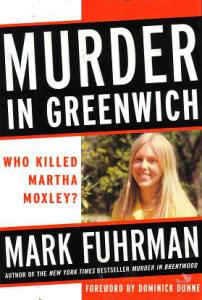 For my review of Franz Kafka’a The Metamorphosis (adapted by Peter Kuper), click here.
For my review of Franz Kafka’a The Metamorphosis (adapted by Peter Kuper), click here.
True Crime: I happened upon it quite by accident, when reading an update on appeal of the amazingly entitled Michael Skakel, convicted of murdering fifteen-year-old Martha Moxley in her own front yard. Apart from the crime’s own shocking nature is the jaw-dropping reality that the Greenwich, Connecticut police were either too incompetent or inexperienced to find the young girl’s killer—or were they cowed by the sleazy Kennedy name and money that tries to lord over everything it touches (and frequently destroys)? Former police detective and author Mark Furhman investigated years later and literally wrote the book on how Skakel’s name became seriously linked to the murder. For my review, click here.
I was so impressed with Fuhrman’s style—as a detective as well as writer—that I sought out another, Murder in Brentwood. Here we are given a glimpse into the cross-aisle backstabbing, soulless ambition and strikingly stupid cult of personality behind the scenes of the infamous O.J. Simpson case that de-armed detective authority and investigation and later destroyed Fuhrman’s career. The author himself is no angel and he comes clean on everything the prosecution accused him of while also rightfully stating something to the effect of the R in racism being today’s scarlet letter—and utilized as recklessly. It’s an amazing story that fills in so many gaps I was shocked to read and even more surprised to learn when I talked to people about it, how widespread is awareness that Fuhrman was totally set up by an ego-enabled prosecution utilizing the wrong tack and a defense that would go to any lengths to win. Most of all, however, it made these two lost souls, people cut down so young, so heartlessly and so devoid of justice, individuals and not just more famous statistics, or distant humans you read of in the papers and then forget about.
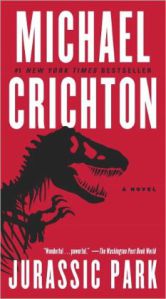 Ann Rule is also a gifted writer, and her book, The Stranger Beside Me too was a recommended read. Utilizing her previous experience as a police officer, she at the time events in the book were occurring, had retired and engaged as a true crime writer for magazines and newspapers. She volunteered for the suicide hotline of a crisis center along with Ted Bundy, who I knew very little about except that he had been a serial killer. I don’t tend to think much about this sort of psychopath, but can guarantee that after reading this book they were on my mind for weeks. My usual rejoinder, “I don’t lose sleep over it, but—” lost a lot of airtime because I did stay awake more than I should have. Reading about the victims of Skakel and Simpson didn’t have the same effect—and I knew this straight away—because while they were targeted, in a set of rages, perhaps, they weren’t random. Bundy, on the other hand, could strike anywhere, and that set me on edge for awhile, especially having read Rule’s descriptive passages of sexual and mental abuse of such horrific nature I could barely comprehend how any human could even think this shit up. I won’t go into details here, just suffice to say that ISIS probably borrowed heavily from Bundy’s catalogue of twisted torture techniques. It’s not something I’m really keen on reading more of, to be quite frank.
Ann Rule is also a gifted writer, and her book, The Stranger Beside Me too was a recommended read. Utilizing her previous experience as a police officer, she at the time events in the book were occurring, had retired and engaged as a true crime writer for magazines and newspapers. She volunteered for the suicide hotline of a crisis center along with Ted Bundy, who I knew very little about except that he had been a serial killer. I don’t tend to think much about this sort of psychopath, but can guarantee that after reading this book they were on my mind for weeks. My usual rejoinder, “I don’t lose sleep over it, but—” lost a lot of airtime because I did stay awake more than I should have. Reading about the victims of Skakel and Simpson didn’t have the same effect—and I knew this straight away—because while they were targeted, in a set of rages, perhaps, they weren’t random. Bundy, on the other hand, could strike anywhere, and that set me on edge for awhile, especially having read Rule’s descriptive passages of sexual and mental abuse of such horrific nature I could barely comprehend how any human could even think this shit up. I won’t go into details here, just suffice to say that ISIS probably borrowed heavily from Bundy’s catalogue of twisted torture techniques. It’s not something I’m really keen on reading more of, to be quite frank.
Science fiction: Sky fi, as my wee one likes to call it. That’s one thing, but the real question, I found, is: What is it? To be honest, Jurassic Park didn’t strike me as sci-fi and when himself suggested it, I was initially taken aback. It contains science and is a work of fiction, yet for some reason I tended to think of outer space, which I typically only like reading about as non-fiction. Then someone suggested 1984, which really threw me for a loop. So I dropped it all and instead of heading for booklists, the first thing I did was look up the definitions because in order to choose some sci-fi, I first had to be clear what it is.
From the Gunn Center for the Study of Science Fiction: “Science fiction is the literature of the human species encountering change, whether it arrives via scientific discoveries, technological innovations, natural events, or societal shifts.”
(Inserting a small note here: I’ve never heard of Gunn before, so don’t endorse or not endorse them.) At the web page their definition is expanded, but even in keeping with this foundation, it also squares with this one:

Och, who am I kidding? The real reason I’m on so long about this is because I didn’t manage to finish my sci-fi reading challenge. Surprisingly, quite a few titles appealed to me, although in thinking about it, I’d be willing to bet at least a few of them I’d put down after awhile, which is something I haven’t done a lot in recent years. Hyperion caught my eye, but somehow it went back to the library unread, and later I settled on Jurassic Park, 1984 and The Time Machine, though only ever finished the first. (I did read 1984 in elementary school, if that can score me some points). And while they weren’t official choices for the challenge, I can’t say enough about Richard Abbott’s Far from the Spaceports series, the first of which shares the series title and the second, Timing, continues the adventures.
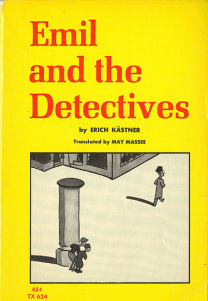 Both involve Mitnash Thakur and his AI partner, Slate, battling financial fraud in space colonies near Jupiter, though terminating the criminal activity doesn’t tend to involve standard, earth-like consequences. The colonial culture and detective angles also drew me in, and I’m certain these will both be re-reads.
Both involve Mitnash Thakur and his AI partner, Slate, battling financial fraud in space colonies near Jupiter, though terminating the criminal activity doesn’t tend to involve standard, earth-like consequences. The colonial culture and detective angles also drew me in, and I’m certain these will both be re-reads.
The other ones, though … I just couldn’t get interested enough to read them. I did have “discipline” in mind as a factor toward the challenge, though when push came to shove, didn’t see much worth in disciplining one’s self to read something, for leisure, that one can’t get into. I did open my mind to the genre, though, which is the real goal, and may return to those titles at a later date.
It might have helped if I didn’t have others that appealed more, but contributing likely was also my own all-around reading slowdown. Once I finished the massive pile of reviews I’d needed to do, I told myself I would read, during Christmas break, only what I wanted to read—which turned out to be not much. I picked out a few books but simply spent a lot of time doing other things. I’m rarely not in the mood to read, but it does happen, and when it does, it’s a sizeable block. Close to the end I picked up a bunch of children’s books, the easier reading of which has jump-started me in the past. I pretty rapidly went through an old favorite, Kästner’s Emil and the Detectives, which was as absolutely fabulous as it ever was. I may even write a tad about it in the new year. A couple of others I began and passed on, and as of this writing I’m still reading Company of Fools (Ellis), whose story has also pulled me in.
And, finally …
Five off my neglected TBR shelves:
 I didn’t have particular titles in mind, though at the time I wrote up a blog about the ideas, I was eyeing a certain few. It wasn’t long before I had to remind myself that lots of my leisure reading is determined pretty much by mood and what I feel like reading, so even had I definitively chosen, they stood a chance of being displaced—or not. It just depends.
I didn’t have particular titles in mind, though at the time I wrote up a blog about the ideas, I was eyeing a certain few. It wasn’t long before I had to remind myself that lots of my leisure reading is determined pretty much by mood and what I feel like reading, so even had I definitively chosen, they stood a chance of being displaced—or not. It just depends.
As it happens, this year, like last, most of my reading was for reviewing, so very few of my own books came off the TBR. I did, however, manage to meet and exceed my five: Thomas Jefferson and the Tripoli Pirates: The Forgotten War that Changed American History by Brian Kilmeade and Don Yaeger; The Revolving Door of Life, Precious and Grace, The Woman Who Walked in Sunshine, The Bertie Project and The Uncommon Appeal of Clouds, all by Alexander McCall Smith; and three Peter St. John Gang books I’ve been after since I reviewed one last year: Gang Loyalty, Gang Petition, Gang Territory and Gang Spies. As you can see, I’m a great fan of both McCall Smith and St. John, the latter of whom has at least two more on backorder that I mean to read—and I say that with great emphasis! Semi-autobiographical stories of an orphan evacuee from the Blitz, these tales are funny, poignant and delightful, with a re-readability factor that’s out of this world.
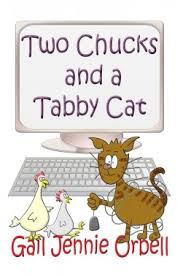 A lot of books I’ve read this year have really great covers (e.g. Cometh the Hour, The Popish Midwife, Company of Liars), which had been a focus of many discussions I’ve seen across 2017, two of which I was privileged to be a part of. Another, Hand of Glory by Susan Boulton, came at a great moment, set during and after the Great War as it is, given my sort of “re-awakening” to the era. For the past couple of years I’ve been remembering all the Siegfried Sassoon we’d studied in high school and telling myself to dip into the era some more. Boulton’s story contains a mythical twist and the war portions are written with such dexterity: sensitivity but also a knowing of harsh realities, and some resulting passages simply wind into your reading being. And, at the risk of overloading anyone else’s TBR or shopping lists, speaking of getting into you: Jennie Orbell’s Two Chucks and a Tabby Cat had me laughing nearly all the way through, even at passages that weren’t always topics of humor. Orbell has such a feel for the foibles of humanity and a witty way of pointing them out to us, all while knowing when to retreat.
A lot of books I’ve read this year have really great covers (e.g. Cometh the Hour, The Popish Midwife, Company of Liars), which had been a focus of many discussions I’ve seen across 2017, two of which I was privileged to be a part of. Another, Hand of Glory by Susan Boulton, came at a great moment, set during and after the Great War as it is, given my sort of “re-awakening” to the era. For the past couple of years I’ve been remembering all the Siegfried Sassoon we’d studied in high school and telling myself to dip into the era some more. Boulton’s story contains a mythical twist and the war portions are written with such dexterity: sensitivity but also a knowing of harsh realities, and some resulting passages simply wind into your reading being. And, at the risk of overloading anyone else’s TBR or shopping lists, speaking of getting into you: Jennie Orbell’s Two Chucks and a Tabby Cat had me laughing nearly all the way through, even at passages that weren’t always topics of humor. Orbell has such a feel for the foibles of humanity and a witty way of pointing them out to us, all while knowing when to retreat.
Retreat is what I did once in awhile, as you can see scattered through my 2017 reads here, by backing away from reviews and picking up one of my own, most of which are listed above. I love to write reviews, mind you, and I admit it felt a little odd to be reading a book with no intention (at least at the outset, and some I had to reprimand myself and say no) of writing it up. That happened at the end of the year as well, and taking a couple of weeks off to be reading whatever I pick up off the shelf has been simply grand.
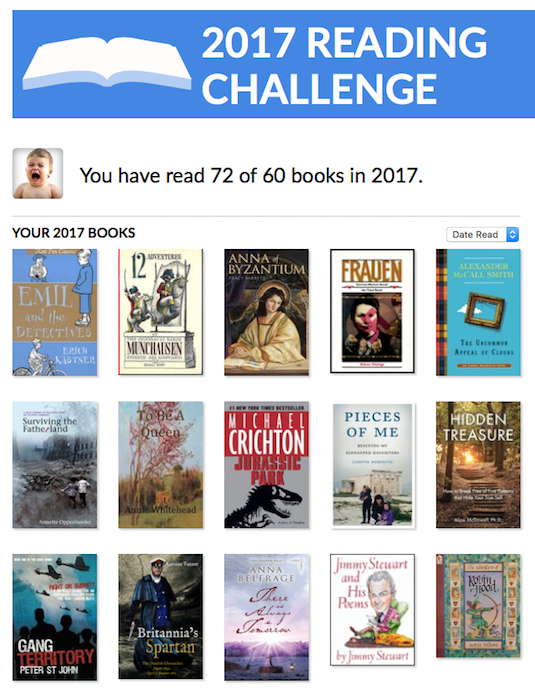 Reads from the last part of 2017, some of which you may see again in these pages. As mentioned elsewhere, numbers weren’t the goal, though you have to plug something in. (Click image for full Goodreads spread.)
Reads from the last part of 2017, some of which you may see again in these pages. As mentioned elsewhere, numbers weren’t the goal, though you have to plug something in. (Click image for full Goodreads spread.)
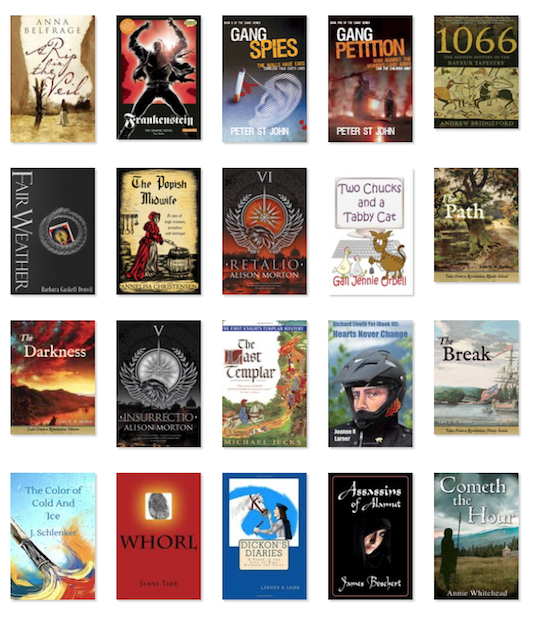 2017 saw the conclusion of my 1066 series (see tab in sidebar for links to posts), and the beginning to my Knights Templar (Michael Jecks) following. I’ve got the next two queued up to read as I type.
2017 saw the conclusion of my 1066 series (see tab in sidebar for links to posts), and the beginning to my Knights Templar (Michael Jecks) following. I’ve got the next two queued up to read as I type.
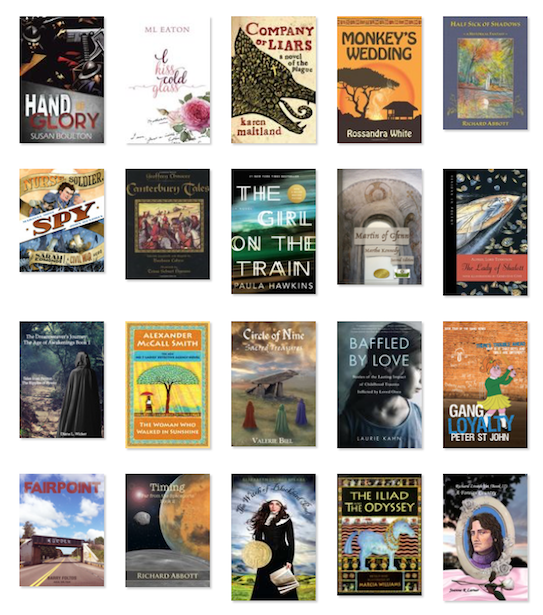 My reading of Susan Boulton’s Hand of Glory really revved my engines for more about the Great War. A mystery with supernatural and mythological twists, the novel has great staying power.
My reading of Susan Boulton’s Hand of Glory really revved my engines for more about the Great War. A mystery with supernatural and mythological twists, the novel has great staying power.
 I’m hoping to dip into more reading about the Barbary Wars, having finally found a great start with Brian Kilmeade and Don Yaeger’s Thomas Jefferson and the Tripoli Pirates.
I’m hoping to dip into more reading about the Barbary Wars, having finally found a great start with Brian Kilmeade and Don Yaeger’s Thomas Jefferson and the Tripoli Pirates.
*********
Previous entries in the Reading 2017 series:
The Importance of Covers (Book Bloggers Group Chat)
Readers’ Chat with Stephanie Hopkins
Origins of the Challenge
Reading Challenge 2017
New Genre Library (True Crime): Murder in Greenwich
New Genre Library (Graphic Novel): The Metamorphosis
New Genre Library (Science Fiction): Jurassic Park
New Genre Library is a three-part spinoff series of Reading 2017
*********
Thanks for reading and may 2018 be your best year yet! Advertisements Share this: